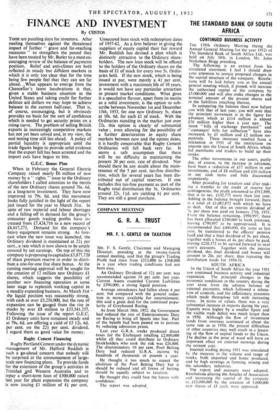FINANCE AND INVESTMENT By CUSTOS THESE are puzzling days for
investors. After steeling themselves against the threatened impact of further " grave and far-reaching measures " to strengthen the pound they have been treated by Mr. Butler to a most en- couraging review of the balance of payments position. Relief and anti-climax are both reflected in steady but diffident markets in which it is only too clear that for the time being few people feel that they can see far ahead., What appears to emerge from the Chancellor's latest lucubrations is that, given a stable business situation in the United States and taking credit for further defence aid dollars we may hope to achieve balance in the current half-year. That is, of course, encouraging, but it obviously provides no basis for the sort of confidence which is needed to get security prices on a rising curve. The problem of selling British exports in increasingly competitive markets has not yet been solved and, in my view, the real testing time still lies ahead. A policy of partial liquidity is appropriate until the trade figures begin to provide solid evidence that the export fall has been arrested and the import cuts have begun to bite.
G.E.C. Bonus Plan When in February the General Electric Company raised nearly 16 million of new money by a " rights " issue to the Ordinary shareholders I called attention to the merits of the new Ordinary shares around 76s. 6d. as a long-term investment. They have now improved to 79s. 6d. and this movement looks fully justified in the light of the report just issued for the year to March 31st. In spite of raw material and labour shortages and a falling off in demand for the group's consumer goods trading profits have in- creased from £7,424,716 to a new record of £8,617,275. Demand for the company's heavy equipment remains strong. As fore- cast when the new issue was launched, the Ordinary dividend is maintained at 22+ per cent., is rate which is now shown to be amply covered by net earnings. On top of this the company is proposing to capitalise £5,877,720 of share premium reserve in order to distri- bute a one-for-one free share bonus. At the coming meeting approval will be sought for the creation of 12 million new Ordinary £1 shares, which suggests the possibility of another new financing operation at some later stage to replenish working capital in a steadily expanding business. At March 31st the liquid position was reasonably strong, with cash at over £5,256,000, but the rate of expansion can be gauged from the rise in stocks by over £8 million to £33,541,257. Following the issue of the report G.E.C. £1 Ordinary units have remained steady and at 79s. 6d. are offering a yield of £5 12s. 6d. per cent. on the 22+ per cent. dividend. I regard them as good value for money.
Rugby Cement Financing
Rugby Portland Cement under the dynamic management of Mr. Halford Reddish is such a go-ahead concern that nobody will be surprised at the announcement of larp- scale new financing plans. To provide funds for the extension of the group's activities in Trinidad And Western Australia and to repay a short-term loan of £500,000 raised last year for plant expansion the company is now issuing £1 million of 4} per cent. Unsecured loan stock with redemption dates of 1957-62. As a firm believer in giving the suppliers of equity capital their fair reward Mr. Reddish has devised a plan which is distinctly attractive to the Ordinary share- holders. The new loan stock will be offered to the holders of the Ordinary shares on the basis of £1 of stock for every two 5s. Ordin- aries held. If the new stock, which is being issued at par, were merely a 4+ per cent. investment with a maximum life of 10 years, it would not have any particular attraction in present market conditions. What gives it a speculative flavour, apart from its merits as a solid investment, is the option to sub- scribe between November 1st and December 15th, 1953, for one new Ordinary 5s. share at 10s. 6d. for each £1 of stock. With the Ordinaries standing in the market just over 22s. this option is clearly of substantial value ; even allowing for the possibility of a further deterioration in equity share markets between now and the option dates, it is hardly conceivable that Rugby Cement Ordinaries will fall back very far. It seems a safe assumption that there will be no difficulty in maintaining the present 20 per cent. rate of dividend. Nor should there be, any doubt about the main- tenance of the 5 per cent, tax-free distribu- tion, which for several years has been dis- tributed out of capital reserves. If one includes this tax-free payment as part of the Rugby total distribution the 5s. Ordinaries around 22s. 1fd. are yielding 64 per cent. They are still a good purchase.


























 Previous page
Previous page